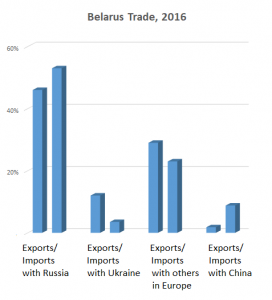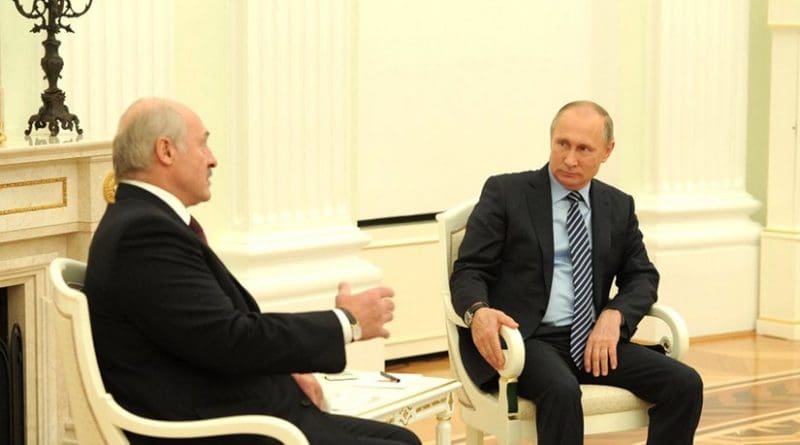Belarus’ Strategic Solitude – Analysis
Belarus aims for a policy of neutrality with Europe, the US and Russia, but new tensions emerge over energy issues.
By Michał Romanowski*
Over the past two decades, relations between Russia and Belarus have been in constant flux. Both countries share a Soviet legacy and strong ethnic ties, but these have not stopped them from playing hard ball with each other. Moscow and Minsk have developed deep interdependence, and main bones of contention usually encompass business and military matters.
Throughout 2018, Belarusian-Russian tensions over energy issues resulted in belligerent rhetoric from both sides. Today the problem focuses on a new tax regime for oil introduced by Russia. This tax maneuver would cost the Belarusian economy billions of dollars and President Alexander Lukashenko is concerned about serious internal perturbations undermining his authoritarian grip over the nation of about 10 million people. Lukashenko has been president since 1994.
Russia offers an alternative solution, or ultimatum, as some observers argue. A deal would coerce Belarus into deeper integration with Moscow and, in return, Russian subsidies for Minsk would be kept intact. President Vladimir Putin met with his Belarusian counterpart twice in December and again in February to discuss the divergent positions: In sum, Russia concentrates on restricting Belarus’ foreign policy while lowering the alliance’s costs for the Kremlin’s budget while Minsk pushes for greater independence and more non-returnable loans.
With this latest episode in a series of Russia-Belarus disputes, it is increasingly evident that Belarus lacks reliable partners and alliances even as it shares borders with four countries besides Russia – Latvia, Lithuania, Poland and Ukraine. The West has had difficulties dealing with the regime still deemed authoritarian, one demonstrating little respect for civil liberties and human rights. Russia for its part often treats Minsk instrumentally, applying pressure and striking convenient bargains with Lukashenko as needed. Consequently, Lukashenko has skillfully pursued a multi-vector foreign policy.
The 2013/2014 revolution in Ukraine, annexation of Crimea, and the war in Donbas were milestones that again altered Minsk’s relations with Moscow and the West. After these destabilizing events in its direct neighborhood, Belarus issued a statement calling for peace, and the government has not recognized Crimea as Russian territory.
In the years that followed the crisis in Ukraine, Belarusian authorities have stressed neutrality as a fundamental tenet of the country’s foreign policy – this can only be a quick fix that neither facilitates relations with the European Union and the United States nor satisfies the Kremlin. Still, the strategy is efficient, considering that the Lukashenko regime’s overriding goal is self-preservation. Neutrality does not enlarge Minsk’s circle of friends, but as the prime objective is to exert lucrative concessions from both Moscow and the West, the approach is relatively successful.

Lukashenko has played Russia and the West off one another for the past 25 years. He reverts to public diplomacy any time his economic or political interests are endangered and repeatedly accuses Moscow of using coercion to convince Minsk to further integration. During the 2018 state-of-the-nation address, he said that strained relations with Moscow would not stop Belarus from seeking cooperation with Brussels and Washington.
Belarus has no other choice than to collaborate with Russia. Minsk remains dependent on Moscow financially continuing to receive loans and subsidies including oil and gas discounts. Belarusian authorities have developed a quaint oil business model that allows the country to import cheap product from Russia, refine it domestically, and sell to Europe at market price. Russia is also Belarus’ top trade and investment partner. Whereas Minsk seems to be an indispensable part of Russia’s integration projects, including Collective Security Treaty Organization and the Eurasian Economic Union, and is crucial from the Kremlin’s military standpoint. Belarus shields Russia with its air-defense system in addition to hosting two military installations – the missile launch tracking station and the communication center for atomic submarines. Terms of lease agreements on these facilities expire in 2021 and will definitely be utilized as leverage in negotiations with Russia. With all that in mind, Moscow cannot afford to lose Belarus as it lost Ukraine.
Russia’s aggressive foreign policy and economic stagnation have become sufficient incentives for the Belarusian authorities to normalize relations with the West. Progress is slow, but the dialogue is there. As a result, the European Union permanently eased most of the sanctions against Belarus in 2016. The United States offered temporary relief, to be reviewed in fall of 2019.
In addition, Washington might help Belarus reduce its economic dependence on Russia by facilitating a loan from the International Monetary Fund and bringing trade and investments. The IMF suspended talks in summer 2018 after the government balked at recommendations for reforms increasing the private sector. About 75 percent of industry and GDP is under state control. Now, Belarus seeks to resume negotiations for the $3 billion credit line at low interest. In October, Lukashenko met with US Assistant Secretary of State Wess Mitchell, the highest ranking American diplomat in a decade. In January, Belarus lifted a cap on the number of US diplomats allowed in the country, and Belarusian Foreign Minister Vladimir Makei reported that negotiations continue on the return of the US ambassador, whom Belarus expelled in 2008.
Minsk’s wobbling policy irritates both Russia and the West. Lukashenko put repressive practices on hold, but has yet to commit to structural political and economic reforms as demanded by Brussels and Washington. Russia wishes to move forward with integration, setting up a full union state with single currency, customs and judiciary system. Moscow also has a tactical goal to set up a full-scale military base in Belarus – a plan opposed by Belarus as this could lead to loss of sovereignty.
A notion widespread in Belarus is that the main threat for the country is escalation of tensions between Russia and the West. In case of a conflict, Belarus lying between east and west would become a chief victim. Thus, Lukashenko’s policy includes criticizing both Russia as well as the West, while also occasionally sending encouraging signals to one side or the other. In December, Belarusian Defense Minister Andrei Ravkov explained that if a US base opened in Poland this would be a military challenge to Belarus and the country would have to revise its position regarding hosting the Russian facilities.
Belarusian willingness to act more independently on the international arena has grown in recent years. However, Lukashenko’s options and foreign policy tools are limited. On one side, Minsk keeps the channels of communications with the West open, but disregards human rights domestically. On the other, he claims Russia is a brotherly nation to his country while resisting Russian efforts to beef up its military presence in Belarus.
Serious tensions between Russia and Belarus are likely to continue in the coming months. In the long-term, Minsk is doomed to be adrift between the West and Moscow unless Russia steps up its geopolitical game in Eastern Europe.
*Michał Romanowski is a fellow with The German Marshall Fund of the United States in Warsaw.


“Sleeping next to an elephant,” is what Pierre Trudeau called Canada’s position next to the USA. There are some parallels with Belarus. You hope for the best but plan for the worst.